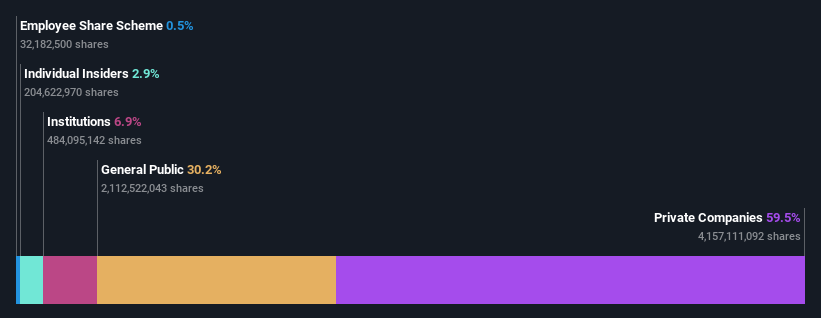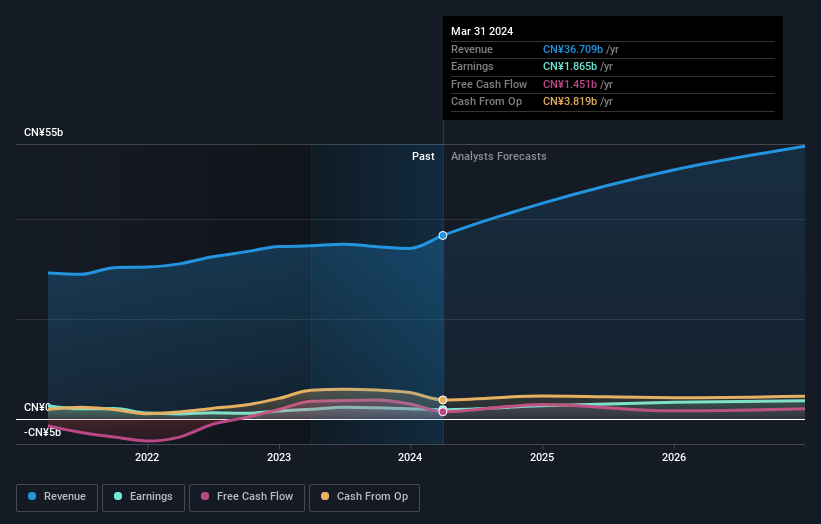- China
- /
- Electronic Equipment and Components
- /
- SZSE:002600
Private companies in Lingyi iTech (Guangdong) Company (SZSE:002600) are its biggest bettors, and their bets paid off as stock gained 11% last week

Key Insights
- Significant control over Lingyi iTech (Guangdong) by private companies implies that the general public has more power to influence management and governance-related decisions
- The largest shareholder of the company is Lingsheng Investment (Jiangsu) Co., Ltd. with a 59% stake
- Ownership research along with analyst forecasts data help provide a good understanding of opportunities in a stock
If you want to know who really controls Lingyi iTech (Guangdong) Company (SZSE:002600), then you'll have to look at the makeup of its share registry. And the group that holds the biggest piece of the pie are private companies with 59% ownership. That is, the group stands to benefit the most if the stock rises (or lose the most if there is a downturn).
Clearly, private companies benefitted the most after the company's market cap rose by CN¥4.1b last week.
In the chart below, we zoom in on the different ownership groups of Lingyi iTech (Guangdong).
View our latest analysis for Lingyi iTech (Guangdong)

What Does The Institutional Ownership Tell Us About Lingyi iTech (Guangdong)?
Many institutions measure their performance against an index that approximates the local market. So they usually pay more attention to companies that are included in major indices.
We can see that Lingyi iTech (Guangdong) does have institutional investors; and they hold a good portion of the company's stock. This suggests some credibility amongst professional investors. But we can't rely on that fact alone since institutions make bad investments sometimes, just like everyone does. If multiple institutions change their view on a stock at the same time, you could see the share price drop fast. It's therefore worth looking at Lingyi iTech (Guangdong)'s earnings history below. Of course, the future is what really matters.

Lingyi iTech (Guangdong) is not owned by hedge funds. Our data shows that Lingsheng Investment (Jiangsu) Co., Ltd. is the largest shareholder with 59% of shares outstanding. This essentially means that they have extensive influence, if not outright control, over the future of the corporation. For context, the second largest shareholder holds about 2.1% of the shares outstanding, followed by an ownership of 0.6% by the third-largest shareholder. Fangqin Zeng, who is the second-largest shareholder, also happens to hold the title of Chief Executive Officer.
Researching institutional ownership is a good way to gauge and filter a stock's expected performance. The same can be achieved by studying analyst sentiments. Quite a few analysts cover the stock, so you could look into forecast growth quite easily.
Insider Ownership Of Lingyi iTech (Guangdong)
The definition of company insiders can be subjective and does vary between jurisdictions. Our data reflects individual insiders, capturing board members at the very least. The company management answer to the board and the latter should represent the interests of shareholders. Notably, sometimes top-level managers are on the board themselves.
Insider ownership is positive when it signals leadership are thinking like the true owners of the company. However, high insider ownership can also give immense power to a small group within the company. This can be negative in some circumstances.
Our most recent data indicates that insiders own some shares in Lingyi iTech (Guangdong) Company. This is a big company, so it is good to see this level of alignment. Insiders own CN¥1.2b worth of shares (at current prices). If you would like to explore the question of insider alignment, you can click here to see if insiders have been buying or selling.
General Public Ownership
The general public-- including retail investors -- own 30% stake in the company, and hence can't easily be ignored. While this size of ownership may not be enough to sway a policy decision in their favour, they can still make a collective impact on company policies.
Private Company Ownership
Our data indicates that Private Companies hold 59%, of the company's shares. It might be worth looking deeper into this. If related parties, such as insiders, have an interest in one of these private companies, that should be disclosed in the annual report. Private companies may also have a strategic interest in the company.
Next Steps:
I find it very interesting to look at who exactly owns a company. But to truly gain insight, we need to consider other information, too. For instance, we've identified 1 warning sign for Lingyi iTech (Guangdong) that you should be aware of.
If you would prefer discover what analysts are predicting in terms of future growth, do not miss this free report on analyst forecasts.
NB: Figures in this article are calculated using data from the last twelve months, which refer to the 12-month period ending on the last date of the month the financial statement is dated. This may not be consistent with full year annual report figures.
New: AI Stock Screener & Alerts
Our new AI Stock Screener scans the market every day to uncover opportunities.
• Dividend Powerhouses (3%+ Yield)
• Undervalued Small Caps with Insider Buying
• High growth Tech and AI Companies
Or build your own from over 50 metrics.
Have feedback on this article? Concerned about the content? Get in touch with us directly. Alternatively, email editorial-team (at) simplywallst.com.
This article by Simply Wall St is general in nature. We provide commentary based on historical data and analyst forecasts only using an unbiased methodology and our articles are not intended to be financial advice. It does not constitute a recommendation to buy or sell any stock, and does not take account of your objectives, or your financial situation. We aim to bring you long-term focused analysis driven by fundamental data. Note that our analysis may not factor in the latest price-sensitive company announcements or qualitative material. Simply Wall St has no position in any stocks mentioned.
Have feedback on this article? Concerned about the content? Get in touch with us directly. Alternatively, email editorial-team@simplywallst.com
About SZSE:002600
Lingyi iTech (Guangdong)
Provides smart manufacturing services and solutions.
Excellent balance sheet and fair value.

